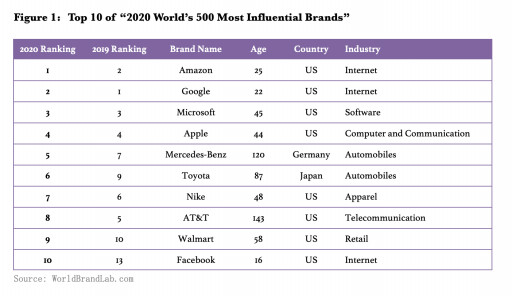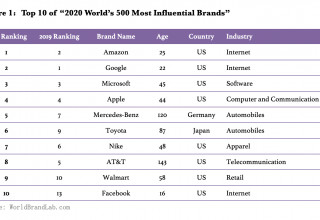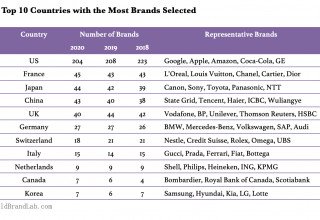Amazon, Google and Microsoft claimed the top three slots; the United States had the most representation, with France, Japan, China and the UK following behind as the second camp
NEW YORK – December 16, 2020 – (Newswire.com)
The 2020 World’s 500 Most Influential Brands (17th edition) list — exclusively compiled by World Brand Lab — was released on Dec. 16 in New York. Thanks to the consumer increases brought about by the pandemic, last year’s runner-up, Amazon, defeated Google to top the list; Google fell to second place; and Microsoft, whose net profit increased significantly in fiscal 2020, took third.
Following three key indicators of brand influence, namely market share, brand loyalty and global leadership, World Brand Lab tracked more than 15,000 leading brands around the globe and to pioneer the World’s 500 Most Influential Brands list. The 2020 World’s 500 Most Influential Brands list includes brands from 30 countries. Judging by brand distribution, the United States occupies 204 seats in the top 500, holding first place among major nations. France, Japan, China and the United Kingdom have 45, 44, 43 and 40 brands listed, respectively, establishing them as the second camp globally. In particular, China surpassed the UK for the first time this year, ranking fourth among all countries, in a continuing trend. Germany, Switzerland and Italy make up the third tier of brand powerhouses, with 27, 18 and 15 selected brands, respectively.
A total of 42 brands are new to the list this year. Among the new brands on the list, the highest-ranked is T-Mobile from Germany, in the 213th position. Other notable brands such as BVLGARI and Van Cleef & Arpels also made the rankings. Newly listed brands from China include Chow Tai Fook, BAOWU, CNOOC, Beidahuang and China Merchants Bank. Affected by COVID-19, brands from the retail, travel and aviation sectors were this year’s biggest losers. Macy’s, Virgin Atlantic and Airbnb fell sharply, and British Airways and Japan Airlines dropped off of the list altogether. The average age of the brands in the 2020 World’s 500 Brands list was 96.76 years old, slightly lower than last year’s average age of 101.94 years old. Among them, there are 213 time-honored brands that are more than a century old. The United States accounts for almost 40% of these with 81 brands. Among the 43 brands from China, only Moutai, Tsingtao Brewery, Wuliangye and Bank of China can boast more than 100 years in business.
The joint research team of World Brand Lab and Superfinance found a relationship between brand value and ESG performance. In this regard, George Serafeim, Professor of Business Administration at Harvard Business School, who will attend the World Executive Summit on Dec. 22, believes that, until recently, few investors paid attention to environmental, social, and governance (ESG) data — information about companies’ carbon footprints, product safety, labor policies, board makeup, and other such topics. Today, such data is widely used by investors and increasingly defining issues for the competitiveness of many countries, industries and companies. In a world that is increasingly judging companies and brands on their ESG performance, brands must look to more fundamental drivers — particularly strategy — to achieve real results and be rewarded for them. Our research points to the need for a new management paradigm for corporate leaders, one in which ESG considerations are embedded in both strategy and operations.
Pierre Chandon, Professor of Marketing at INSEAD, who will also attend the World Executive Summit, expressed his attention about “Brands for Good”: “People around the world are increasingly demanding action in favor of sustainability and making big changes themselves. Around the world, the COVID-19 pandemic has only intensified interest in sustainability. This shift has opened business opportunities. A study of 36 consumer categories found that sustainability-marketed brands have accounted for 55% of category growth in the past five years despite representing only 16% of the market. This growth has been converted into brand value. In fact, the positive association between the value of a brand and its ESG performance has increased in recent years, especially for top-performing brands. To achieve a win-win in the fight against the global pandemic, brands should draw on all available means.”
Haisen Ding, CEO of the World Executive Group and member of the World Brand Lab expert panel, believes that brands need to be accountable not only to consumers but also to stakeholders. “COVID-19 has accelerated the shift in values among consumers who want brands not only to provide value for them but also to take a stand on ESG issues. Brands need to change their value framework according to the change of consumer targets so as to carry out marketing innovations in the direction of ‘Brands for Good.'”
Since 2013, World Brand Lab has tracked more than 80,000 major brands in 60 countries. This leading brand consulting, research and evaluation firm, is chaired by Professor Robert Mundell, the 1999 Nobel laureate in Economics, and is wholly owned by World Executive Group. World Brand Lab is dedicated to brand valuation, brand strategy, brand naming, brand design and brand protection.
Press Release Service
by
Newswire.com
Original Source:
World Brand Lab Releases '2020 World's 500 Most Influential Brands'
















